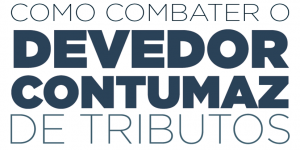New legislation of the State of Paraná
starts to differentiate the default bad debt
ETCO develops material with the objective of clarifying in a clear and simplified way, what is the Debtor Contumaz, the losses that this type of debtor causes to the country and how we must combat it.
The State of Paraná published Decree Law No. 3.864, which qualifies the Contumaz ICMS Debtor, also establishing that the CRE (State Revenue Coordination of PR) may determine a special control, inspection and payment regime for taxpayers considered permanent debtors. .
This is one of the ways that the ETCO defends: the inclusion of the concept of incumbent debtor in the new rules for the collection of the Union's active debt and instruments to combat companies that practice anti-competitive prices.
Click here and access the full Decree Law
 One of ETCO's priority projects is the fight against the Contumaz Tax Debtor, which, unlike the tax evader, issues a note and notifies the tax authorities that it has sold its products, but does not collect taxes on it and uses this illicit advantage to reduce its prices and gain market unfairly. Understand what the default debtor is and what we can do to combat it
One of ETCO's priority projects is the fight against the Contumaz Tax Debtor, which, unlike the tax evader, issues a note and notifies the tax authorities that it has sold its products, but does not collect taxes on it and uses this illicit advantage to reduce its prices and gain market unfairly. Understand what the default debtor is and what we can do to combat it
Gaining an advantage over competitors, gaining a market and increasing profits through systematic non-payment of declared taxes: this is what the so-called heavy duty debtors do, businessmen who make default a way to gain market quickly. To debate the main issues surrounding the theme, the ETCO-Brazilian Institute of Competition Ethics promoted on the 16th of November, in partnership with the Valor Econômico newspaper, the seminar “The Debtor Contumaz and Competition Ethics”.
The event received judges, judges, lawyers, as well as the Federal Revenue Secretary, Jorge Rachid, and the São Paulo Finance Secretaries, Renato Villela. “Duty to tax is a taxpayer’s right under normal conditions,” recalled Evandro Guimarães, president of the ETCO Institute. “Making it your own business is a crime. We need to find weapons to combat this practice ”.
The Seminar showed the actions that are being developed by the Federal Revenue Service and the Secretariats of Finance to recover tax credits and discussed the need for legal instruments to punish the taxpayer who declares tax, but does not pay it systematically. It also presented the case of the state of Rio Grande do Sul, which established a differentiated collection regime for the frequent debtor and obtained important results.
To deepen the discussion, ETCO is preparing a publication with the points covered and the paths that were presented at the event, which should be launched next month.
I owe and don't deny, I pay when I can. Such decisions do not help companies that owe the tax authorities, let alone exempt them from fines and sanctions. Their situation is aggravated when there is a lawsuit for the collection or execution of tax debts in progress. However, the severity of the fines' punishment is not linked to the nature of the tax, but to the way the taxpayer declares it, explains Márcio da Costa, president of the FecomercioSP Tax Affairs Council and the Taxpayer Defense Council (Codecon)
Source: Valor Econômico (18/11)
To read the full story, click here.
The Brazilian legal system is going through a phase of reformulation of its set of laws, with more specific rules, which typify certain forms of crime. It is, for example, what can be observed in Law 12.486 / 2013, known as the Anti-Corruption Law, which has a total focus on administrative and civil liability of companies that commit harmful acts against the public administration. But, in the case of the figure Debtor Contumaz, there is still “a legal vacuum”, in the opinion of tax lawyer Hugo Funaro. “Traditional mechanisms are insufficient. Some states are resorting to different regimes, but this works like net fishing. They take together both big debtors and hard debtors, ”he says.
Source: Valor Econômico (18/11)
To read the story straight from the source, click here.
In the midst of the economic crisis and a drop in federal government revenue, and with a balance of R $ 1, 3 trillion to be received in tax debts, the IRS establishes working groups with new strategies to redeem part of this liability. The objective is to permanently monitor the debtor's assets, in general the large companies that resort to legal tricks to protect their assets from the tax authorities.
Source: Valor Econômico (18/11)
To read the full story, click here.
The event is sponsored by ETCO-Brazilian Institute of Ethics in Competition and discusses topics such as typification of permanent debtors, differentiated inspection regimes, market impacts and limits on free competition.
The seminar is aimed at presidents, CEOs, lawyers, corporate legal department executives, public farm attorneys, federal judges, judiciary officials and members of the judiciary and legislative branch.
